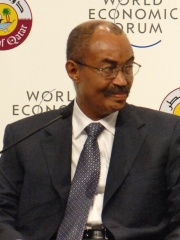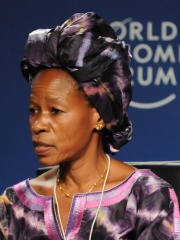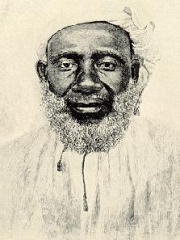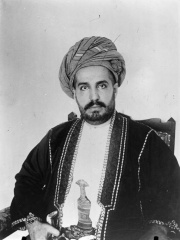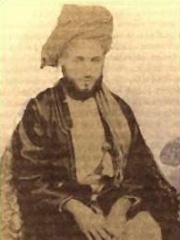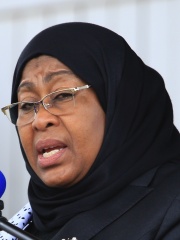
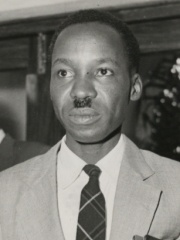
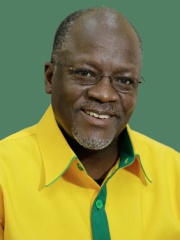
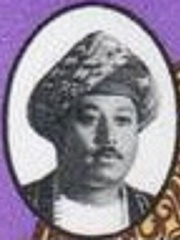
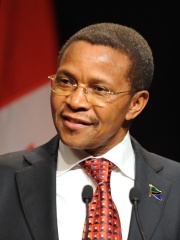

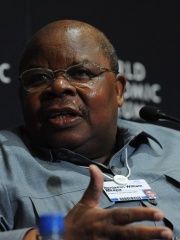

The Most Famous
POLITICIANS from Tanzania
This page contains a list of the greatest Tanzanian Politicians. The pantheon dataset contains 19,576 Politicians, 19 of which were born in Tanzania. This makes Tanzania the birth place of the 109th most number of Politicians behind Sri Lanka, and Guinea-Bissau.
Top 10
The following people are considered by Pantheon to be the top 10 most legendary Tanzanian Politicians of all time. This list of famous Tanzanian Politicians is sorted by HPI (Historical Popularity Index), a metric that aggregates information on a biography's online popularity. Visit the rankings page to view the entire list of Tanzanian Politicians.

1. Samia Suluhu Hassan (b. 1960)
With an HPI of 71.94, Samia Suluhu Hassan is the most famous Tanzanian Politician. Her biography has been translated into 66 different languages on wikipedia.
Samia Suluhu Hassan ( SAH-mee-ah soo-LOO-hoo HA-san; born 27 January 1960) is a Tanzanian politician and the sixth president of Tanzania, serving since 19 March 2021. She is the first woman to serve in the position and previously served as vice-president of Tanzania from 2015 to 2021, from which she ascended to the presidency following the death of her predecessor, John Magufuli. A native of Zanzibar, Suluhu served as a minister in the semi-autonomous region from 2000 to 2010. She then served as the Member of Parliament for the Makunduchi constituency from 2010 to 2015 and was the Minister of State in the Vice-President's Office for Union Affairs from 2010 to 2015. In 2014, she was elected as the vice-chairperson of the Constituent Assembly tasked with the drafting of the country's new constitution. Suluhu became Tanzania's first female vice-president following the 2015 general election, after being elected on the Chama Cha Mapinduzi (CCM) ticket with Magufuli. Suluhu and Magufuli were re-elected to a second term in 2020. As president, Suluhu implemented policies intended to limit the spread of the COVID-19 pandemic in Tanzania, which Magufuli had denied was a serious issue. Other focuses of her presidency have included the expansion of infrastructure and the globalisation of the Tanzanian economy through investors and tourism. In the 2025 Tanzanian general election, her CCM government banned the main opposition party, Chadema, from taking part; the leader of the party, Tundu Lissu, was charged with treason and arrested. The election was marred with electoral violence and irregularities, which led to protests. Early in her presidency she had a positive image as a reformer, but as of 2025, her rule is increasingly viewed by scholars as being authoritarian.

2. Julius Nyerere (1922 - 1999)
With an HPI of 70.49, Julius Nyerere is the 2nd most famous Tanzanian Politician. His biography has been translated into 80 different languages.
Julius Kambarage Nyerere (Swahili: [ˈdʒulius kɑᵐbɑˈɾɑɠɛ ɲɛˈɾɛɾɛ]; 13 April 1922 – 14 October 1999) was a Tanzanian politician, anti-colonial activist, and political theorist. He governed Tanganyika as prime minister from 1961 to 1962 and then as president from 1962 to 1964, after which he led its successor state, Tanzania, as president from 1964 to 1985. He was a founding member and chair of the Tanganyika African National Union (TANU) party and of its successor, Chama Cha Mapinduzi, from 1954 to 1990. Ideologically an African nationalist and African socialist, he promoted a political philosophy known as Ujamaa. Born in Butiama, Mara, then in the British colony of Tanganyika, Nyerere was the son of a Zanaki chief. He studied at Makerere College in Uganda and then Edinburgh University in Scotland. In 1952 he returned to Tanganyika, married, and worked as a school teacher. In 1954, he helped form TANU, through which he campaigned for Tanganyikan independence from the British Empire. Influenced by the Indian independence leader Mahatma Gandhi, Nyerere preached non-violent protest to achieve this aim. Elected to the Legislative Council in the 1958–1959 elections, Nyerere then led TANU to victory at the 1960 general election, becoming prime minister. Negotiations with the British authorities resulted in Tanganyikan independence in 1961. In 1962, Tanganyika became a republic, with Nyerere elected as its first president. His administration pursued decolonisation and the "Africanisation" of the civil service while promoting unity between indigenous Africans and the country's Asian and European minorities. He encouraged the formation of a one-party state and unsuccessfully pursued the Pan-Africanist formation of an East African Federation with Uganda and Kenya. A 1963 mutiny within the army was suppressed with British assistance. Following the Zanzibar Revolution of 1964, the island of Zanzibar was unified with Tanganyika to form Tanzania. After this, Nyerere placed a growing emphasis on national self-reliance and socialism. Although his socialism differed from that promoted by Marxism–Leninism, Tanzania developed close links with Mao Zedong's China. In 1967, Nyerere issued the Arusha Declaration which outlined his vision of Ujamaa. Banks and other major industries and companies were nationalized; education and healthcare were significantly expanded. Renewed emphasis was placed on agricultural development through the formation of communal farms, although these reforms hampered food production and left areas dependent on food aid. His government provided training and aid to anti-colonialist groups fighting white-minority rule throughout southern Africa and oversaw Tanzania's 1978–1979 war with Uganda which resulted in the overthrow of Ugandan President Idi Amin. In 1985, Nyerere stood down and was succeeded by Ali Hassan Mwinyi, who reversed many of Nyerere's policies. He remained chair of Chama Cha Mapinduzi until 1990, supporting a transition to a multi-party system, and later served as mediator in attempts to end the Burundian Civil War. Nyerere was a controversial figure. Across Africa he gained widespread respect as an anti-colonialist and in power received praise for ensuring that, unlike many of its neighbours, Tanzania remained stable and unified in the decades following independence. His construction of the one-party state and use of detention without trial led to accusations of dictatorial governance, while he has also been blamed for economic mismanagement. He is held in deep respect within Tanzania, where he is often referred to by the Swahili honorific Mwalimu ("teacher") and described as the "Father of the Nation".

3. John Magufuli (1959 - 2021)
With an HPI of 67.84, John Magufuli is the 3rd most famous Tanzanian Politician. His biography has been translated into 61 different languages.
John Pombe Joseph Magufuli (29 October 1959 – 17 March 2021) was a Tanzanian politician who served as the country's fifth president, serving from 2015 until his death in 2021. He served as Minister of Works, Transport and Communications from 2000 to 2005 and 2010 to 2015 and was chairman of the Southern African Development Community from 2019 to 2020. First elected as a Member of Parliament in 1995, he served in the Cabinet of Tanzania as Deputy Minister of Works from 1995 to 2000, Minister of Works from 2000 to 2005, Minister of Lands and Human Settlement from 2006 to 2008, Minister of Livestock and Fisheries from 2008 to 2010, and as Minister of Works for a second time from 2010 to 2015. Running as the candidate of Chama Cha Mapinduzi (CCM), the country's dominant party, Magufuli won the October 2015 presidential election and was sworn in on 5 November 2015; he was re-elected in 2020. He ran on a platform of reducing government corruption and spending while also investing in Tanzania's industries, but his rule had autocratic tendencies, as seen in restrictions on freedom of speech, restrictions on LGBTQ rights, and a crackdown on members of the political opposition and civil society groups. Despite all the accusations, a spokesman for the ruling party assured that Magufuli would not remain in power beyond the two limits allowed by the constitution. Under his presidency, Tanzania experienced one of the strongest economic growths on the continent (6% on average per year according to the IMF) and moved from the category of lower-low income countries to lower-middle income countries. Contrary to leaders elsewhere in the world, Magufuli ordered COVID-19 testing to stop and resisted calls to implement public health measures during the COVID-19 pandemic in Tanzania. He also expressed distrust of American- and European-developed vaccines, preferring to rely on faith to protect his nation. Magufuli's approach has been characterised as COVID-19 denialism. His death on 17 March 2021 was attributed by the government to a long-standing heart issue. He was succeeded by his vice-president, Samia Suluhu.

4. Jamshid bin Abdullah of Zanzibar (1929 - 2024)
With an HPI of 66.61, Jamshid bin Abdullah of Zanzibar is the 4th most famous Tanzanian Politician. His biography has been translated into 26 different languages.
Jamshid bin Abdullah Al Busaidi, (Arabic: جمشيد بن عبد الله البوسعيدي; 16 September 1929 – 30 December 2024) was a Zanzibari royal who was the last reigning Sultan of Zanzibar. He was deposed in the Zanzibar Revolution, after the United Kingdom gave up its British protectorate.
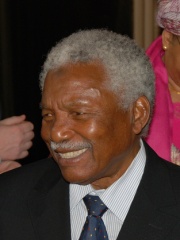
5. Ali Hassan Mwinyi (1925 - 2024)
With an HPI of 64.13, Ali Hassan Mwinyi is the 5th most famous Tanzanian Politician. His biography has been translated into 40 different languages.
Ali Hassan Mwinyi (8 May 1925 – 29 February 2024) was a Tanzanian politician who served as the second president of the United Republic of Tanzania from 1985 to 1995. Previous posts included Minister for Home Affairs and Vice President. He also was chairman of the ruling party, the Chama Cha Mapinduzi (CCM) from 1990 to 1996. During Mwinyi's terms, Tanzania took the first steps to reverse the socialist policies of Julius Nyerere. He relaxed import restrictions and encouraged private enterprise. It was during his second term that multi-party politics were introduced under pressure for reform from foreign and domestic sources. Often referred to as Mzee Rukhsa ("everything goes"), he pushed for liberalization of morals, beliefs, values (without breaking the law), and the economy.

6. Jakaya Kikwete (b. 1951)
With an HPI of 63.79, Jakaya Kikwete is the 6th most famous Tanzanian Politician. His biography has been translated into 52 different languages.
Jakaya Mrisho Kikwete (born 7 October 1950) is a Tanzanian politician who was the fourth president of Tanzania, in office from 2005 to 2015. Prior to his election as president, he was the Minister for Foreign Affairs from 1995 to 2005 under his predecessor, Benjamin Mkapa. He also served as the chairperson of the African Union in 2008–2009 and the chairman of the Southern African Development Community Troika on Peace, Defence and Security in 2012–2013.

7. Kassim Majaliwa (b. 1961)
With an HPI of 63.68, Kassim Majaliwa is the 7th most famous Tanzanian Politician. Her biography has been translated into 28 different languages.
Kassim Majaliwa Majaliwa (born 22 December 1960) is a Tanzanian politician who served as the Prime Minister of Tanzania from 2015 to 2025. He was appointed by President John Magufuli after the 2015 general election. He is a member of the ruling Chama Cha Mapinduzi party and has been a Member of Parliament for Ruangwa.

8. Benjamin Mkapa (1938 - 2020)
With an HPI of 62.81, Benjamin Mkapa is the 8th most famous Tanzanian Politician. His biography has been translated into 45 different languages.
Benjamin William Mkapa (12 November 1938 – 23 July 2020) was the third president of Tanzania, in office from 1995 to 2005. He was Chairman of the Revolutionary State Political Party (Chama Cha Mapinduzi, CCM).

9. Cleopa Msuya (1931 - 2025)
With an HPI of 61.05, Cleopa Msuya is the 9th most famous Tanzanian Politician. His biography has been translated into 25 different languages.
Cleopa David Msuya (4 January 1931 – 7 May 2025) was the Prime Minister of Tanzania from 7 November 1980 to 24 February 1983 and again from 7 December 1994 to 28 November 1995.
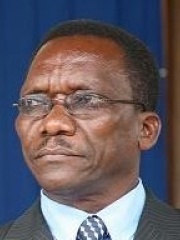
10. Mizengo Pinda (b. 1948)
With an HPI of 60.34, Mizengo Pinda is the 10th most famous Tanzanian Politician. His biography has been translated into 26 different languages.
Mizengo Kayanza Peter Pinda (born 12 August 1948) is a Tanzanian CCM politician who was the 11th prime minister of Tanzania from 2008 to 2015. He was a Member of Parliament from 2000 to 2015.
People
Pantheon has 19 people classified as Tanzanian politicians born between 1834 and 1961. Of these 19, 7 (36.84%) of them are still alive today. The most famous living Tanzanian politicians include Samia Suluhu Hassan, Jakaya Kikwete, and Kassim Majaliwa. The most famous deceased Tanzanian politicians include Julius Nyerere, John Magufuli, and Jamshid bin Abdullah of Zanzibar.
Living Tanzanian Politicians
Go to all RankingsSamia Suluhu Hassan
1960 - Present
HPI: 71.94
Jakaya Kikwete
1951 - Present
HPI: 63.79
Kassim Majaliwa
1961 - Present
HPI: 63.68
Mizengo Pinda
1948 - Present
HPI: 60.34
Amani Abeid Karume
1948 - Present
HPI: 56.90
Asha-Rose Migiro
1956 - Present
HPI: 54.39
Anna Tibaijuka
1950 - Present
HPI: 49.04
Deceased Tanzanian Politicians
Go to all RankingsJulius Nyerere
1922 - 1999
HPI: 70.49
John Magufuli
1959 - 2021
HPI: 67.84
Jamshid bin Abdullah of Zanzibar
1929 - 2024
HPI: 66.61
Ali Hassan Mwinyi
1925 - 2024
HPI: 64.13
Benjamin Mkapa
1938 - 2020
HPI: 62.81
Cleopa Msuya
1931 - 2025
HPI: 61.05
Tippu Tip
1837 - 1905
HPI: 60.06
Khalid bin Barghash of Zanzibar
1874 - 1927
HPI: 59.68
Majid bin Said of Zanzibar
1834 - 1870
HPI: 58.87
Rashidi Kawawa
1926 - 2009
HPI: 52.64
Edward Lowassa
1953 - 2024
HPI: 52.36
Ali Mohamed Shein
1948 - Present
HPI: 50.20
Overlapping Lives
Which Politicians were alive at the same time? This visualization shows the lifespans of the 11 most globally memorable Politicians since 1700.

